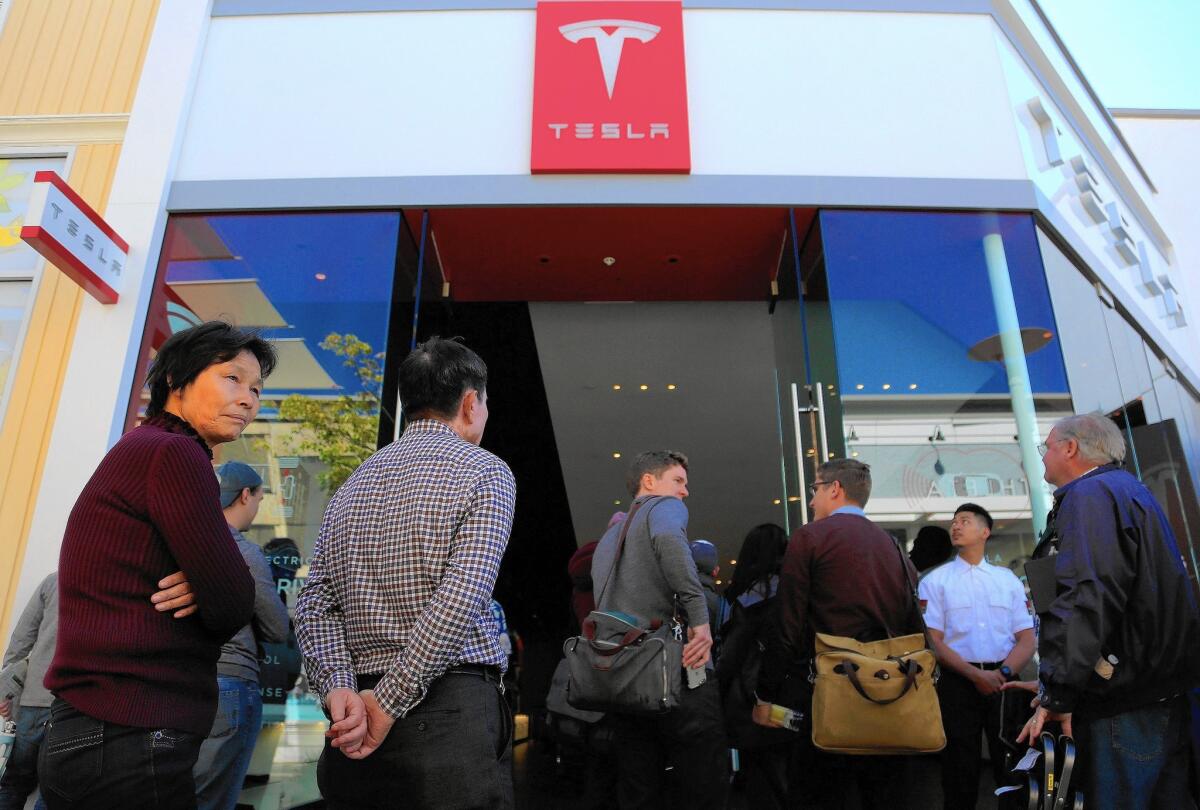Tesla’s Model 3 hype aside, electric car sales are far from robust

Car buyers at a La Jolla dealership wait in line last month to plunk down $1,000 to reserve Tesla’s newest electric car, the $35,000 Model 3 sedan.
- Share via
The recent hoopla around Tesla’s planned Model 3 might lead one to think electric-car sales are surging. They’re not.
The lines of customers in front of Tesla Motor Inc.’s dealerships March 31 did underline how electric cars have a growing presence in the automotive world.
Those customers were waiting to plunk down $1,000 to reserve Tesla’s newest product, the $35,000 Model 3 sedan. Reservations topped 325,000, Tesla Chief Executive Elon Musk tweeted, even though the car won’t be available until late 2017.
SIGN UP for the free California Inc. business newsletter >>
Despite the buzz surrounding the Model 3 and Tesla’s two existing vehicles, the top-selling Model S sedan and the recently introduced Model X sport utility vehicle, electric-car sales remain a drop in the bucket for the U.S. auto industry.
Pure electric cars such as those sold by Tesla — that is, not counting hybrids that use batteries and a conventional internal-combustion engine — totaled 71,064 last year, according to the Electric Drive Transportation Assn., a trade group in Washington.
That amounted to only 0.4% of the record 17.4 million cars sold in the United States in 2015. Throw in the hybrids, and the electric-car industry’s sales totaled 498,426 last year, but that still was a mere 2.9% of the market.
In addition, the industry’s sales and market share fell from 2014, when sales totaled 570,945 and accounted for 3.5% of overall U.S. car purchases.
Nonetheless, “we have established a good foothold in the market,” said Genevieve Cullen, president of the Electric Drive Transportation Assn. “All the major automakers are investing in some form of electrification.”
At least a dozen pure electric cars are produced not only by Tesla but by the likes of BMW, Mercedes-Benz, Nissan, Chevrolet, Ford and Fiat. And others are on the way, including the McLaren P1 at $1.15 million.
There also are several other hybrid models, notably the popular Toyota Prius, which run on a combination of electric power and conventional internal-combustion engines.
See more of our top stories on Facebook >>
The question is how rapidly more U.S. consumers will take a hard look at electric cars. That could depend on how rapidly battery technology keeps improving, so that consumers can drive longer distances without recharging.
“People are perhaps cautious in adapting to new models of transportation, and it’s our job to demonstrate how it works,” Cullen said.
But, she acknowledged, “the internal-combustion engine has a 100-year head start.”
Twitter: PeltzLATimes
MORE BUSINESS NEWS
Millennials are better than we thought at saving money, studies find
How Disney used shell companies to start its Magic Kingdom
Why one of the world’s top flavor makers keeps visiting UC Riverside for inspiration







